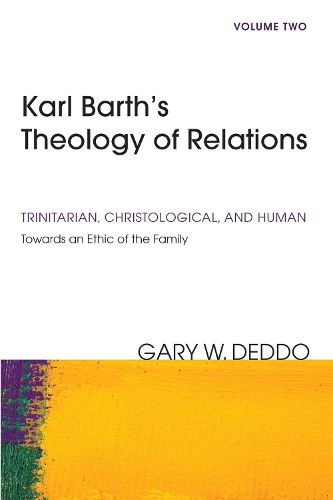Readings Newsletter
Become a Readings Member to make your shopping experience even easier.
Sign in or sign up for free!
You’re not far away from qualifying for FREE standard shipping within Australia
You’ve qualified for FREE standard shipping within Australia
The cart is loading…






This title is printed to order. This book may have been self-published. If so, we cannot guarantee the quality of the content. In the main most books will have gone through the editing process however some may not. We therefore suggest that you be aware of this before ordering this book. If in doubt check either the author or publisher’s details as we are unable to accept any returns unless they are faulty. Please contact us if you have any questions.
This work, originally published as one volume in the Peter Lang series, Issues in Systematic Theology, is now available in two volumes. In the first volume, Gary Deddo shows how Barth grasped the nature of relations as intrinsic to the being and act of the Triune God and to God’s relations to us and our relationship to God in Christ. Deddo then completes his comprehensive survey showing how Barth saw the reality of the divine relationships analogically pertains, by grace, to humanity and its creaturely relationships. Barth’s doctrine of God, Christology, and theological anthropology are all intrinsically onto-relational (to borrow a term coined by Thomas F. Torrance). In the second volume, Deddo shows how Barth’s relational theology is intrinsically ethical. As a case study Deddo explicates Barth’s ethical teaching on the relationship between parents and children found in section 54 of his chapter on Freedom in Fellowship in CD, III/4. He further demonstrates the relevance and fruitfulness of Barth’s theology of relations for critically engaging other theological and non-theological views of the family and for shedding ethical light on a wide range of contemporary issues facing families, especially in the North American context. Karl Barth is known for his insight into the inseparability of act and being in God. What is less recognized is that Barth’s theological understanding of dynamic, covenantal relationship is also essential to his doctrine of the Triune God, his Christology and theological anthropology. God is revealed in Jesus Christ to be one in act, being and relation. Humanity is revealed in Jesus Christ to be essentially a unity of act, being and relation. The failure to see the ethical implications of Barth’s theology can be traced in large part to the failure to gasp how Barth’s understanding of God’s being and act is also essentially relational. Deddo’s work corrects this oversight and opens up the door to better comprehension of Barth’s trinitarian doctrine of God, his Christology, anthropology and ethics.
$9.00 standard shipping within Australia
FREE standard shipping within Australia for orders over $100.00
Express & International shipping calculated at checkout
This title is printed to order. This book may have been self-published. If so, we cannot guarantee the quality of the content. In the main most books will have gone through the editing process however some may not. We therefore suggest that you be aware of this before ordering this book. If in doubt check either the author or publisher’s details as we are unable to accept any returns unless they are faulty. Please contact us if you have any questions.
This work, originally published as one volume in the Peter Lang series, Issues in Systematic Theology, is now available in two volumes. In the first volume, Gary Deddo shows how Barth grasped the nature of relations as intrinsic to the being and act of the Triune God and to God’s relations to us and our relationship to God in Christ. Deddo then completes his comprehensive survey showing how Barth saw the reality of the divine relationships analogically pertains, by grace, to humanity and its creaturely relationships. Barth’s doctrine of God, Christology, and theological anthropology are all intrinsically onto-relational (to borrow a term coined by Thomas F. Torrance). In the second volume, Deddo shows how Barth’s relational theology is intrinsically ethical. As a case study Deddo explicates Barth’s ethical teaching on the relationship between parents and children found in section 54 of his chapter on Freedom in Fellowship in CD, III/4. He further demonstrates the relevance and fruitfulness of Barth’s theology of relations for critically engaging other theological and non-theological views of the family and for shedding ethical light on a wide range of contemporary issues facing families, especially in the North American context. Karl Barth is known for his insight into the inseparability of act and being in God. What is less recognized is that Barth’s theological understanding of dynamic, covenantal relationship is also essential to his doctrine of the Triune God, his Christology and theological anthropology. God is revealed in Jesus Christ to be one in act, being and relation. Humanity is revealed in Jesus Christ to be essentially a unity of act, being and relation. The failure to see the ethical implications of Barth’s theology can be traced in large part to the failure to gasp how Barth’s understanding of God’s being and act is also essentially relational. Deddo’s work corrects this oversight and opens up the door to better comprehension of Barth’s trinitarian doctrine of God, his Christology, anthropology and ethics.